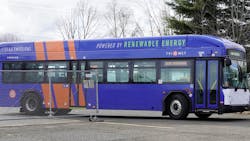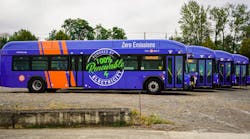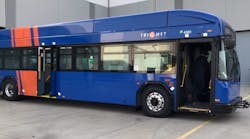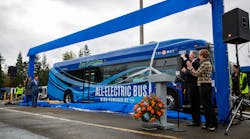TriMet has received the first four of 24 third-generation GILLIG zero-emissions buses. The buses will help TriMet in transiting its bus fleet to 100 percent zero-emissions by 2040. A fifth bus is on its way to TriMet and more are scheduled for delivery in spring and summer 2024. Some of the new electric buses could be in service as soon as spring 2024.
TriMet’s first-generation battery-electric buses, which the agency introduced in 2019, are short-range buses that charge mid-route. The agency’s second-generation battery-electric buses are longer-range electric buses, brought on board in 2021.
The new buses can hold more of a charge than the existing long-range buses, with a 33 percent boost to energy storage compared to TriMet’s second-generation buses. Testing will determine the effective range of the buses, which the agency estimates to be at least 150 miles year-round.
The buses also are equipped for flexible charging. Unlike the previous long-range buses, the new buses have overhead charge rails that will allow them to be easily hooked up to TriMet’s fast charging stations in Beaverton, Ore., as well as charging ports they’ll use at TriMet’s Powell Operations Facility in southeast Portland, where they initially will be housed. The agency has already installed 24 plug-in chargers in anticipation of their arrival.
This is the largest expansion yet of TriMet's electric bus fleet. With the new vehicles, TriMet will more than triple the number of electric buses in service.
During the coming weeks and months, TriMet will be performing rigorous testing and inspections of the new electric buses for safety and efficiency. TriMet hopes to have the full two dozen electric buses in service by September.
Switching to renewable diesel for TriMet’s fixed-route diesel buses and WES trains has reduced the agency’s emissions by nearly 70 percent since 2022.






